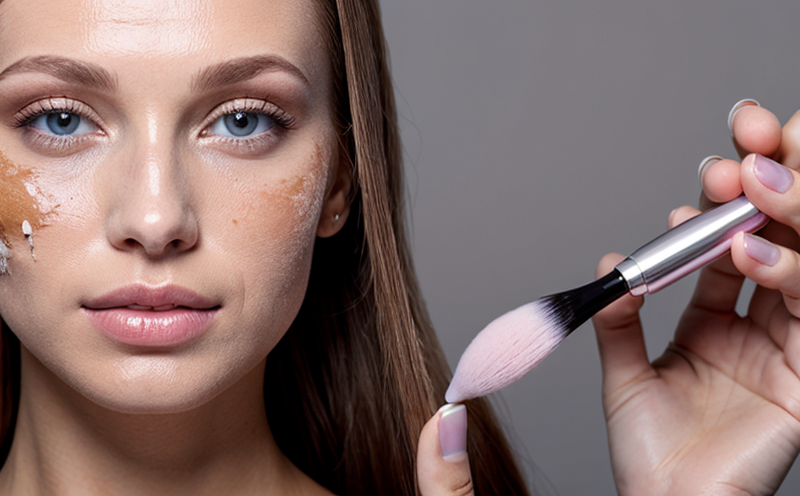Cosmetic Packaging Safety Compliance Testing
The cosmetic packaging safety compliance testing service ensures that all aspects of your product's packaging meet stringent regulatory requirements. This is critical in maintaining consumer trust and ensuring your products are safe for use.
Regulatory bodies around the world have established various standards to ensure that cosmetics are not only effective but also safe for consumers. In Europe, this includes compliance with EU Regulation (EC) No 1223/2009. The United States follows the guidance provided by FDA, and in Asia, countries like Japan adhere to JIS (Japanese Industrial Standards).
The primary focus of our service is on the safety aspects of cosmetic packaging. This includes ensuring that materials used do not release harmful substances into contact with the cosmetics, and that they are stable under various environmental conditions such as temperature changes or exposure to light.
Our comprehensive testing covers a wide range of physical, chemical, and biological parameters. For instance, we test for volatile organic compounds (VOCs), heavy metals, and bacteriological content. We also examine the structural integrity of the packaging under different stress conditions to ensure it remains intact during transportation and use.
The testing process involves several stages. First, we receive the samples from your company, which are then prepared for analysis in our state-of-the-art laboratory. This includes cleaning the samples thoroughly to remove any external contaminants that might interfere with our tests. Next, we conduct initial screening tests to identify potential issues early on.
After this preliminary step, more detailed testing is carried out using advanced analytical instruments such as ISO 4892-1 for flammability testing and ASTM D5573 for resistance to chemicals. We also use ISO 4308-1 to test for impact resistance.
The results of these tests are meticulously documented and summarized in a detailed report provided to you. This report includes all findings, along with recommendations if any areas were found non-compliant with regulatory standards. Our team is always available to discuss the results and assist with rectification where necessary.
We understand that compliance can be complex, which is why we offer training sessions on how to interpret our reports and implement corrective actions effectively. Additionally, we provide support throughout the entire process, ensuring you stay compliant with all relevant regulations without unnecessary delays or costs.
Applied Standards
The cosmetic packaging safety compliance testing service adheres strictly to internationally recognized standards to ensure that our results are credible and universally accepted. Here are some of the key standards we follow:
- ISO 4892-1: Plastic materials -- Determination of burning behaviour -- Part 1: Test method using a vertical specimen (flame spread)
- ASTM D5573: Standard test methods for resistance to chemicals
- ISO 4308-1: Plastics -- Determination of impact resistance by means of free-fall hammer method
- ASTM D6751: Standard specification for flexible packaging materials used in the containment of cosmetics and personal care products
- ISO 4308-2: Plastics -- Determination of impact resistance by means of pendulum impact tester method (pendulum hardness)
These standards provide us with a framework within which we can perform our tests accurately and consistently. By following these guidelines, we ensure that every test conducted is reliable and comparable to those performed elsewhere.
Scope and Methodology
The scope of cosmetic packaging safety compliance testing includes evaluating both the materials used in the packaging and the final product itself. Our methodology ensures that all aspects are thoroughly examined, focusing particularly on potential risks associated with the use of certain substances.
- Material Analysis: We analyze the materials to check for the presence of harmful chemicals such as bisphenol A (BPA), phthalates, and other endocrine disruptors. This helps us identify any potential risks before they become a problem.
- Chemical Stability: We assess how stable the packaging is when exposed to various environmental factors like heat, light, and humidity. This ensures that the product remains safe throughout its shelf life.
- Bacteriological Testing: To ensure hygiene standards are maintained, we conduct bacteriological testing on the packaging surface to check for any microorganisms that could pose a health risk.
The methodology we employ involves multiple steps. Firstly, samples of the packaging material and finished product are collected from your company. These samples undergo rigorous cleaning processes to remove any external contaminants before being subjected to our tests. Once cleaned, the samples are tested according to internationally recognized standards mentioned earlier in this section.
Our team of experts then interprets the results and prepares a detailed report that includes all findings along with recommendations for compliance if necessary. If there are non-compliant areas identified during testing, we work closely with you to find solutions tailored specifically to your needs.
Use Cases and Application Examples
Cosmetic packaging safety compliance testing finds application in a variety of scenarios where ensuring the safety and quality of cosmetic products is paramount. Below are some use cases:
- New Product Launches: Before launching a new product onto the market, thorough testing ensures that all components meet regulatory requirements.
- Routine Quality Assurance: Regular testing helps maintain consistent standards across different batches of products.
- Supply Chain Audits: Testing packaging materials before they enter the supply chain can prevent contamination and ensure quality at every stage.
- Export Compliance: Ensuring that your product complies with local regulations in target markets is crucial for international sales.
- Consumer Protection: By adhering to strict safety standards, you protect consumers from potential harm caused by unsafe packaging.
In each of these scenarios, our service plays a vital role in ensuring that your products meet all necessary safety and quality criteria. This not only enhances consumer confidence but also helps avoid costly legal issues down the line.





